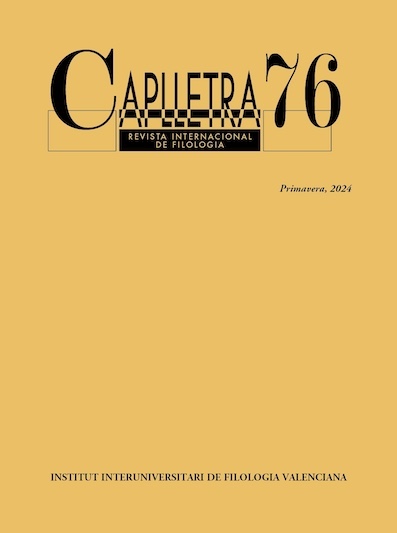Basque-Catalan connections: subject-suppressing impersonals
DOI:
https://doi.org/10.7203/caplletra.76.28209Keywords:
impersonals, subject-suppressing impersonals, passives, es clitic, Basque, Catalan Abstract
Abstract
In this paper we analyze subject-suppressing impersonals (Blevins 2003), that is, constructions that have an implicit and indefinite subject. This configuration has been called impersonal in Basque (Rodet 1992; Ortiz de Urbina 2003; Fernández & Berro 2021) and pronominal clauses with unspecific subject (cat. oracions pronominals de subjecte inespecífic) in Catalan (Bartra 2002). In both languages they have been considered intransitive, given that, instead of two, they consist of a single overt argument (or no argument at all in the case of intransitive verbs). Moreover, in Basque these constructions involve the auxiliary izan ‘be’ —instead of *edun ‘have’— and in Catalan the pronominal clitic es is added. In this paper we will show that the implicit subject of these constructions is syntactically active, and thus we argue that they should be considered typologically similar to those analyzed by Blevins (2003), i.e. impersonal constructions that involve a suppressed subject.
 Downloads
Downloads
Downloads
Published
How to Cite
-
Abstract263
-
PDF (Català)156
Issue
Section
License
Authors submitting work to Caplletra for publication must be the legitimate holder of the usage rights. Legitimacy for the purposes of publishing the work must also include images, tables, diagrams and any other materials that may complement the text, whether they are the author of such material or not.
Copyright: on publishing their work in the journal, the author grants Caplletra. Revista Internacional de Filologia usage rights (reproduction, distribution and public communication) for both the paper printed version and for the electronic version.
All work published in Caplletra is covered by the Creative Commons license type Attribution-NonCommercial-NoDerivatives 4.0 (CC BY-NC-ND 4.0).
RESPONSABILITY
Caplletra. Revista Internacional de Filologia does not necessarily identify with the points of view expressed in the papers it publishes.
Caplletra. Revista Internacional de Filologia accepts no responsibility whatsoever for any eventual infringement of intellectual property rights on the part of authors.






